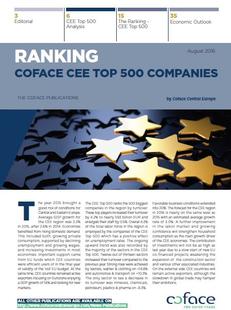

Tunisia
Synthesis
MAJOR MACRO ECONOMIC INDICATORS
| 2020 | 2021 | 2022 (e) | 2023 (f) | 2024 (f) | |
|---|---|---|---|---|---|
| GDP growth (%) | -8.8 | 4.4 | 2.5 | 1.0 | 1.5 |
| Inflation (yearly average, %) | 5.6 | 5.7 | 8.3 | 9.0 | 9.0 |
| Budget balance (% GDP) | -9.0 | -7.6 | -6.6 | -7.0 | -6.5 |
| Current account balance (% GDP) | -5.9 | -6.0 | -8.6 | -5.0 | -5.0 |
| Public debt (% GDP) | 77.6 | 79.9 | 79.8 | 80.0 | 79.0 |
(e): Estimate (f): Forecast
STRENGTHS
- Relatively well diversified economy: manufacturing, petrochemicals, transport, agriculture, tourism
- Proximity to the European market
- Natural resources (olives, phosphates and hydrocarbons), but dependent on weather conditions and subject to strikes
- Tourism potential
- Competitiveness of automotive, aeronautical and medical equipment produced in free trade zones
WEAKNESSES
- Society under stress: youth unemployment (~39%), regional gap between seafront and interior, brain drain and illegal emigration, strikes and demonstrations
- Concentration of power in the Presidency, weak popular support for the new institutions resulting from the Constitution introduced in 2022
- Public sector resistant to reform and a wage bill that weighs heavily on the state budget
- Tourism sector weakened by successive shocks and dependent on the European economy
- Decline in competitive advantages (textiles, tourism)
- Energy dependence
- Prevalent informal economy that is harmful to public finances
RISK ASSESSMENT
Socio-economic difficulties penalise Tunisian growth
Economic activity slumped in 2023 due to weakening private demand on back of high inflation and severe drought that has affected agricultural production. In 2024, growth is expected to remain below 2% owing to persistent economic difficulties. Unemployment will remain very high (15%) and inflation is likely to persist, forcing the central bank to maintain a restrictive monetary policy (key rate at 8% in December 2023). This context will continue to weaken household purchasing power, keeping consumer spending relatively low. Furthermore, investment will remain weak as a result of limited access to external financing. The confidence of domestic and foreign investors has been eroded by the protracted negotiations with the IMF over the implementation of a programme accompanied by a loan (Extended Credit Facility) of USD 1.9 billion over 4 years. A preliminary agreement, reached in November 2022, has still not been approved by the IMF Board – a key step in releasing funds – due to President Saïed's refusal to introduce certain fiscal consolidation measures, such as cutting commodity subsidies and restructuring public entities. Restricted access to external financing, combined with a lack of foreign currency, will continue to curb imports, thereby leading to further shortages (of food, fuel and medicines) and exacerbating inflation. Weak growth will therefore be mainly attributable to exports from the offshore sector (automotive and aeronautical equipment, textiles and agro-industries), helped by a more competitive exchange rate. On the other hand, tourism should continue to make a positive contribution to economic growth in 2024 following its marked recovery in 2023, which was one of the few sectors to record growth. However, as they are strongly linked to the European economic cycle, exports – notably textiles – and tourism will remain below potential and suffer from European economic downturns.
Precarious financial situation in the absence of IMF support
Tunisia’s public and external accounts will remain precarious failing the introduction of the IMF programme. The public deficit is expected to decrease slightly in 2024 due to an anticipated increase in budgetary revenues. The 2024 budget bill includes a temporary additional tax (until 2025) of 4% on the profits of banks and insurance companies, an additional tax of 15% on the profits of multinational and large national groups, an increase in the tourist tax on foreigners, as well as a reduction in the public wage bill to 13.5% of GDP (compared to 14.4% in 2023). However, public expenditures will remain high. The government aims to maintain subsidies (representing 6.5% of GDP), especially in the hydrocarbon sector, to support household purchasing power and at the same time strive to improve cost management (mechanism to control hydrocarbon consumption in the public sector, fiscal measures to encourage the introduction of cleaner energies). The presidential election in the fall of 2024 is also expected to encourage the government to maintain social assistance, although a belt-tightening exercise may be expected post-election. Given limited access to external financing in the absence of the IMF programme and the reluctance of foreign investors, authorities will turn to local banks (including the central bank), bilateral borrowing (for example, from Saudi Arabia and Algeria which have already been approached), as well as to the African Export-Import Bank (Afreximbank) to finance the public deficit. To address its large-scale deficit, the government may delay payments to local suppliers. Public debt, held 80% by multilateral and bilateral creditors (60% and 20%, respectively), will remain at a high level. The risk of default will be high in 2024 when approximately USD 2.6 billion of external debt falls due.
The current account deficit will persist in 2024, with a stable trade balance deficit. The lack of momentum in exports and the tourism sector will be offset by anemic imports due to sluggish domestic demand and their compression through the central bank's retention of foreign exchange. On the other hand, remittances from expatriate workers will continue to be robust. However, amid a tense social context, strikes could disrupt the production of phosphates and hydrocarbons, which will penalise trade. Given weak foreign investment and limited access to international financing, the deficit will be primarily financed by foreign exchange reserves – already is a parlous state – which will fall to a very critical level, i.e., to around 2.5 months of import coverage.
Western support erodes in the face of democratic backsliding
The political climate has undergone a radical change since 2021. A decade after the 2011 revolution, the dysfunctional parliamentary system, where the President, Prime Minister, and Parliament clashed, has been replaced by an ultra-Presidential regime. After being elected in October 2019, President Kaïs Saïed, a former constitutional law professor, gradually imposed his institutional agenda by suspending the Parliament in 2021 and dismissing ministers, including the prime minister. The new Constitution, drafted under his supervision and adopted by referendum in 2022, transformed the Tunisian institutional system into a Presidential regime, weakening the Parliament and the Judiciary. Suspense surrounding the fall 2024 Presidential election and President Saïed's potential re-election is minimal as political parties are marginalised, and opposition figures and journalists face legal action. Nevertheless, social unrest is still a possibility as the election approaches amid a particularly tense backdrop marked by high unemployment and inflation rates.
Western support for Tunisia is being eroded by the country's authoritarian drift and rejection of the programme initially agreed with the IMF and at a time when the country risks defaulting on its debt. However, after a tense episode with the European Commission over President Saïed's initial rejection of budgetary aid, intended in part to improve migration control, relations improved. At the end of December 2023, the EU disbursed EUR 150 million in aid as part of the Memorandum of Understanding for a strategic and comprehensive partnership signed on 16 July 2023 to promote economic recovery, notably by improving the business climate and enhanced management of public finances.
Last updated: April 2024


